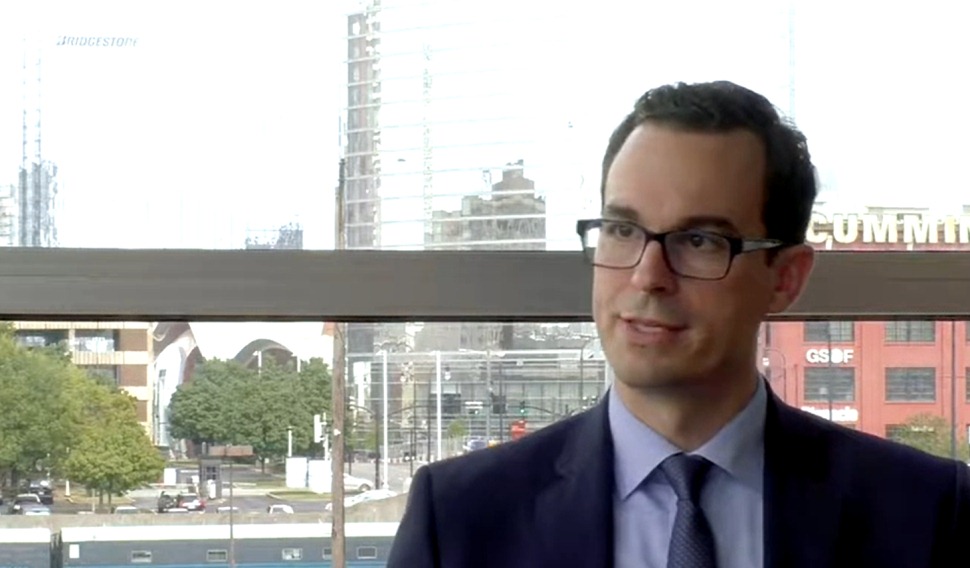Today we have the pleasure of talking to Aaron Dorn, the CEO of Studio Bank about “Leadership With A Purpose.”
TRANSCRIPT
DONNA: Now Aaron, Studio Bank is the first bank in 10 years that has opened. Is that correct?
AARON: That’s right, that’s right.
DONNA: The first new one.
AARON: First one since 2008.
DONNA: That’s pretty amazing.
AARON: Thank you, thank you, yeah. It’s a lot of hard work to get a bank off the ground.
DONNA: So I think what’s really interesting is, you have this stellar banking career, then you went into the military in 2000, Marines, correct?
AARON: The Marines, yep. The United States Marine Corps.
DONNA: And you were there for four years.
AARON: Four years, that’s right.
DONNA: Exited as a?
AARON: Captain.
DONNA: Captain. That’s pretty, you don’t really play around, do you? You just go right for the gusto.
AARON: Well I started, so speaking of Ron Samuels, I started working with him right out of college. Union Planters Bank and then the Regions Bank. He was kind enough to invite me to join the founding team of Avenue.
DONNA: Wow.
AARON: And then after a couple of years of that during the troop surge in Iraq and Afghanistan in 2008 is when I stepped away on military leave and served in the Marine Corps for four years. I was an intelligence officer, took a platoon to Afghanistan. Towards the end of my tour, Ron and the rest of the team asked me to come back in an executive capacity to take over the retail side of the bank. So I ended up doing that, and then became the chief strategy and marketing officer, and worked hand in hand with Ron through the IPO process and shortly thereafter.
DONNA: So Aaron, I’m just curious. How were you inspired to start Studio Bank?
AARON: Well, it really started from a desire to create something. I was working at Avenue Bank, and I wanted to run my own company, and I knew that I was never gonna be able to accomplish that if I was trying to moonlight in my current role that I had at the time of wife, two young kids, and nonprofit service, things like that.
DONNA: Which is a second job in itself.
AARON: Exactly. And so, I need a transition period of some kind. Vanderbilt University, right down the street was kind enough to offer a scholarship on top of the GI bill which also covers school. And that combination of those things allowed me to to feed my family for a couple of years while I went back to graduate school. And the purpose, the whole purpose for me doing that, besides a great education at Vanderbilt University, was to start my own company. And, sure enough, six months after I left, I read the headlines like everyone else that Avenue bank had sold. And by that point, I had done a lot of soul-searching over about six months about what kind of company I wanted to start. And it really came back to a sense of purpose, and what I had a sense of purpose about. And by that point, I’d had a really, a deeper appreciation for the role that banks play, both at the macroeconomic level, which is what they teach you about in graduate school, but also just on a human level. The role that banks play in helping creators create things. And there I was trying to create something myself. And that was the kernel of inspiration, really, behind starting a new bank. And, secondly, it was the people that I wanted to work with every day. That I wanted to show up to work with and just a phenomenal group of people that are not only very smart but are full of great character, vibrant, and I wanted to assemble a wonderful group of people to help bring a vision to life. So it truly was a sense of purpose that caused me to go down this path. And it’s a long, arduous path to start a bank. You’ve gotta raise, in our case we ended up raising about 50 million dollars in total. You have the regulatory process to get through, which can take a long time. A lot of uncertainty in that process. You basically have to have every major decision you’re going to make in your first three years as a company, made upfront before you ever apply to get all the approvals you need. So it’s, but it was that source of, that sense of purpose that really inspired this. And a sense of purpose to fulfill something that I think is crucial to people in general, but also to do that with a team that’s just out of this world fantastic.
DONNA: So your sense of purpose is really internal as well as external.
AARON: That’s right. A sense of purpose, I think, is the most fundamental aspect of the vision for an organization. A lot of people talk about mission, vision, and values as being, kind of, the quintessential three. But a mission should really be about something specific. For example, a mission in banking would be providing financial services, maybe within a geographic sector or within an industry. A sense of purpose overrides that. It’s much broader than that. So I can speak to our, my specific vision here and purpose with Studio. What that started with was an understanding that human beings are fundamentally creators. So we have this, and a lot of people call it the Imago Dei, it’s the image of God in us. It’s that urge to create from nothing. And it’s amazing, actually, if you think about it. That a human can conceive of something in our brains, or in our soul, however, you look at it, and it’s a conception. It’s not anything tangible. It is intangible. But then we have this urge to go turn it into something tangible, to create. But to do that, we have to have resources. And that’s one of the great obstacles to a human being, be able to take something from nothing and make it something. And a bank plays a critical role in being able to provide the resources that are needed. So whether that’s a loan to a business or an individual who is building a company or buying a home or whatever the case may be. It’s the resources that a bank can bring to bear. On top of that, once that person has created something that’s of value, a value to the world, you could say, and is compensated for that, there needs to be a way to safeguard the fruit of their labor. And a bank provides that vital function, as well. And so this understanding, I guess, for me, that hit me was a deeper appreciation for the fact that a bank plays that, you could call it a sacred role, in helping bring creation to life. And from the mind of a creator, into the real world that we all get to experience and benefit from. So that’s the sense of purpose. To empower creators. Now, if you think about that and how that philosophy, if you will, plays out in the recruiting process with people who might wanna join us. It means I wanna have people on board this company who believe in that purpose. That broader purpose. That they want their life to be marked by empowering creators to do their thing. That affects the culture of the organization. It gives a focus on, how can we best serve our clients that are creating things? And so it ends up influencing so many other things through the organization. From the mission to the vision to the values. Eventually to the goals, as well. Because, a lot of times, people think of goals in terms of financial numbers, but there are intangible goals as well. And the numbers, actually, are a way to capture and measure an intangible result. And so, having that sense of purpose from the very beginning even infects the way that you set goals for the organization.
DONNA: Give me an example of that.
AARON: So, I was asked recently, how big do we see Studio Bank being in five to 10 years. And my answer was, well, it depends on how you want to measure impact. Because our goal, derived from our purpose as a company, is really, in the end, it’s an intangible goal. We want to make a dramatic impact on the world, and we wanna do that here in Nashville. Now how that gets measured is, it can be measured in a number of different ways. We wanna make an impact, certainly, for our community at large. For our clients, for our shareholders, for our employees.
And you can measure each of those in different ways. And so, certainly we set financial targets, but we also set other types of targets for ourselves.
DONNA: So, you are really a dream builder. You are the guy who helps those dreams get put into place.
AARON: You know, it’s not just me. I think that’s every human being. It’s every human being. Because again, that’s an urge that every human being has, is to go create something. Take a vision and bring it to life in some way. Even when you have children for the first time, you’re doing that same thing. You’ve got a vision for a family that you’re gonna go out and build. We view our role as bankers, at Studio in particular, but I think bankers in general, as being enablers of that. Or people who empower that by providing the resource to be able to do it. And certainly, the founding of Studio Bank is a way to do that for other people as well. For example, our employees here are motivated by certain factors of having a sense of purpose at work. Working with highly talented, smart people who are also full of character. Things like that. And so, in a way, we’re doing that for ourselves, as well. We’re creating the reality that we wanna see for ourselves with our own company.
For more topics like this and to learn more about how we help our clients, please visit our website.
TAGS: company culture, corporate leadership, customer service, employee management, employee retention, executive leadership, Nashville business, Nashville business leadership

